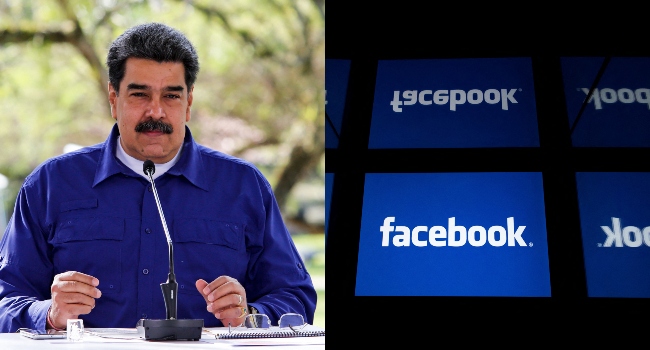Facebook Freezes Venezuela President’s Page Over COVID-19 Misinformation

![]()
Facebook said Saturday that it was “freezing” Venezuelan President Nicolas Maduro’s page for a month after repeated violations of the platform’s rules against Covid-19 misinformation.
The social media giant has faced criticism over the spread of virus-related false information on its network, and has said it is ramping up efforts to fight back.
A Facebook spokesperson said Saturday that Maduro’s page would remain visible but closed to new posts, saying, “Due to repeated violations of our rules, we are also freezing the page for 30 days, during which it will be read-only.”
The spokesperson said Facebook had removed a video from Maduro’s page “for violating our policies against misinformation about Covid-19 that is likely to put people at risk for harm.” It said the administrators of Maduro’s account had previously been warned.
In the video, the socialist leader had promoted the use of the drug Carvativir — saying a few drops under the tongue would provide a “miracle” cure with no side effects — in the latest of a series of remedies he has advocated without medical evidence.
But as the Facebook statement said, citing World Health Organization guidance, “there is currently no medication to cure the virus.”
Maduro had previously lashed out at Facebook and other social media platforms for censuring videos about Carvativir.
– Facebook pledges action –
“They say that until the WHO says yes, I cannot talk about Carvativir,” he said on television in February. “Who is in charge in Venezuela? The owner of Facebook? Who is in charge of the world? The owner of Facebook?”
Facebook says that since the pandemic began, its automated systems have removed more than 12 million posts considered misleading about Covid-19 or the vaccines against it.
The platform, accused in the past of allowing dangerous misinformation about Covid-19 to spread, said in February it was cracking down.
Facebook said it was specifically banning dozens of false claims, such as the assertion that it is safer to get the disease than the vaccine.
The policy covers both Facebook posts and those on Instagram, which Facebook owns.
Venezuela, with a population of around 30 million, has registered nearly 155,000 coronavirus cases and more than 1,500 deaths, according to the Johns Hopkins University Covid tracker, though Maduro’s political opponents say the government-provided numbers are seriously understated.
Venezuela began a vaccination program in February, starting with health workers, using Russia’s Sputnik V vaccine and the Sinopharm vaccine from China. It has said it will soon receive 60,000 doses of a Cuban vaccine.
But Caracas has not authorized the AstraZeneca vaccine, amid questions about possible side effects.
Authorities have become concerned recently about a rise in infections and the appearance of the highly contagious Brazilian strain of the virus.


